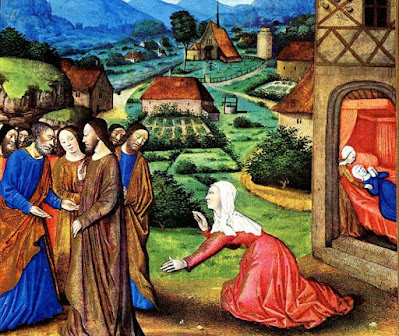Jesus went away and withdrew to the district of Tyre and Sidon. And behold, a Canaanite woman from that region came out and cried, “Have mercy on me, O Lord, Son of David; my daughter is severely possessed by a demon.” But he did not answer her a word. And his disciples came and begged him, saying, “Send her away, for she is crying after us.” He answered, “I was sent only to the lost sheep of the house of Israel.” But she came and knelt before him, saying, “Lord, help me.” And he answered, “It is not fair to take the children’s bread and throw it to the dogs.” She said, “Yes, Lord, yet even the dogs eat the crumbs that fall from their master’s table.” Then Jesus answered her, “O woman, great is your faith! Be it done for you as you desire.” And her daughter was healed instantly.- St. Matthew 15:21-28
In this Gospel passage we see our Lord exercising His ministry in Gentile territory. Tyre and Sidon were cities of Phoenicia. Although these cities were part of Syria, they were all independent, and they were all rivals.
Jesus came to this region probably for a temporary escape from the attacks He was experiencing. The scribes and Pharisees had branded Him as a sinner because of His seeming disregard for their rules and regulations. Herod regarded Him as a threat. The people of Nazareth treated Him with disdain. So we begin to see the movement of the Gospel from the Jews to the Gentiles.
The gospel tells us of a Canaanite woman - a Gentile - coming to Jesus and asking Him for help for her daughter. His answer was that it wasn’t right to take the children’s bread and give it to dogs. At first hearing, this seems rather harsh. In society at that time the dog wasn’t the lovable companion we think of today; rather, it was a symbol of dishonour. To the Greek, the word “dog” referred to a shameless woman. In fact, the Jews often used the word “dog” as a term of contempt for Gentiles. Now, since this word was obviously an insult, how do we explain Jesus’ use of it here?
Jesus came to this region probably for a temporary escape from the attacks He was experiencing. The scribes and Pharisees had branded Him as a sinner because of His seeming disregard for their rules and regulations. Herod regarded Him as a threat. The people of Nazareth treated Him with disdain. So we begin to see the movement of the Gospel from the Jews to the Gentiles.
The gospel tells us of a Canaanite woman - a Gentile - coming to Jesus and asking Him for help for her daughter. His answer was that it wasn’t right to take the children’s bread and give it to dogs. At first hearing, this seems rather harsh. In society at that time the dog wasn’t the lovable companion we think of today; rather, it was a symbol of dishonour. To the Greek, the word “dog” referred to a shameless woman. In fact, the Jews often used the word “dog” as a term of contempt for Gentiles. Now, since this word was obviously an insult, how do we explain Jesus’ use of it here?
First of all, He didn’t use the usual word for the dogs of the street; rather, He used a term which denoted the pet dogs of a household. Also, His tone of voice made all the difference. We know how a word can be used in one way as an insult, or with a different tone can be almost affectionate in its use. We can imagine our Lord’s tone taking some of the harshness out of the word.
In any event, Jesus didn’t shut the door on the woman. The children must be fed, He said, but we can infer from His words that there was food left for the household pets. True, Israel had the first offer of the gospel, but only the first. There were others still to come.
The woman no doubt had a sense of humour, and she saw that Jesus was speaking with a smile. She said, “I know the children must be fed, but might I not get the scraps which the children throw away?” Here was a woman with a faith that wouldn’t take “no” for an answer. This woman, with a daughter tragically ill, still had enough light in her heart to reply with a smile. Her faith was tested, her faith was real, and her prayer was answered. We can see in this woman a symbol of the Gentile world which eventually would receive the Bread of heaven which many of the Jews rejected.
In any event, Jesus didn’t shut the door on the woman. The children must be fed, He said, but we can infer from His words that there was food left for the household pets. True, Israel had the first offer of the gospel, but only the first. There were others still to come.
The woman no doubt had a sense of humour, and she saw that Jesus was speaking with a smile. She said, “I know the children must be fed, but might I not get the scraps which the children throw away?” Here was a woman with a faith that wouldn’t take “no” for an answer. This woman, with a daughter tragically ill, still had enough light in her heart to reply with a smile. Her faith was tested, her faith was real, and her prayer was answered. We can see in this woman a symbol of the Gentile world which eventually would receive the Bread of heaven which many of the Jews rejected.
_____________________________
Pictured: "The Canaanite Woman"
from the Très Riches Heurers du Duc de Berry, ca. 1412
